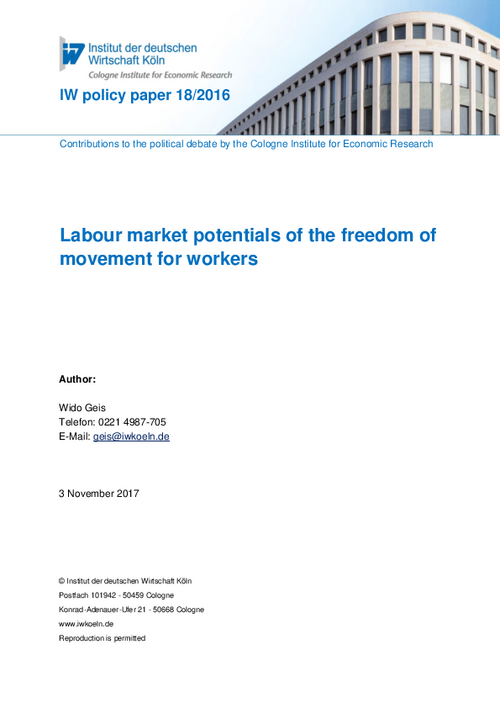The freedom of movement for workers is one of the core principles of the European Union and most Europeans have positive attitude towards it. 75 percent regard it as a good and only 9 percent as a bad thing. Nevertheless, the number of persons moving from one EU member country to another is still small.

Labour market potentials of the freedom of movement for workers
IW policy paper

The freedom of movement for workers is one of the core principles of the European Union and most Europeans have positive attitude towards it. 75 percent regard it as a good and only 9 percent as a bad thing. Nevertheless, the number of persons moving from one EU member country to another is still small.
In 2016, only 3.57 million inhabitants of the EU between 25 and 35 years had the nationality of another member state. This equates to a share of 5.4 percent and is less than the number of third country nationals in this age group with 4.69 million or 7.1 percent. If labour mobility would be enhanced, this could be helpful for all countries. On one hand, it could help the economically strong countries to avoid skill shortage and, on the other hand, it could relieve the burden from the social systems in the countries with high unemployment rates, especially in southern Europe. This does not necessarily hold true for migration flows from the eastern to the western EU member states, as, in this case, the crucial factor is not the difference in the labour market situation but at the welfare level.
The main obstacle to EU mobility is the linguistic divide in Europe. As a consequence of it, most people willing to work in another EU member state have to learn a new language first. This can be very costly in terms of time and money and prevent people from migrating. A joint language that is spoken by all Europeans would be helpful. This could only be English, as it is taught in the schools in all member states. Nevertheless, although, by now, nearly all pupils in Europe get an intense training in English, the language skills of large parts of the adult populations in the EU member states do not yet suffice for a deeper communication in English. Thus, persons who are willing to move still have to learn the language of the destination country. To facilitate this, the supply of language classes in destination countries as well as in the countries of origin should be improved. Moreover, measures that foster transnational social networks can also be helpful, as they give people the chance to use the foreign languages and make contacts in potential destination countries.

Wido Geis: Labour market potentials of the freedom of movement for workers
IW policy paper


Nachhaltigkeitsbericht: ja, aber wie?
Die Europäische Union verpflichtet mit verschiedenen neuen Vorschriften immer mehr Unternehmen dazu, ihre Aktivitäten in Sachen Nachhaltigkeit offenzulegen. Manche Unternehmen erstellen auch bereits auf freiwilliger Basis Nachhaltigkeitsberichte.
IW
„Europa bietet Chancen für mehr Wettbewerb und weniger Bürokratie. Das sollten wir nutzen“
Was bedeuten die Ergebnisse der Europawahl für die Wirtschaft? Im Handelsblatt-Podcast „Economic Challenges“ diskutieren IW-Direktor Michael Hüther und HRI-Präsident Bert Rürup die Folgen der Wahl und warum jetzt Wettbewerbsfähigkeit statt Green-Deal im Fokus ...
IW